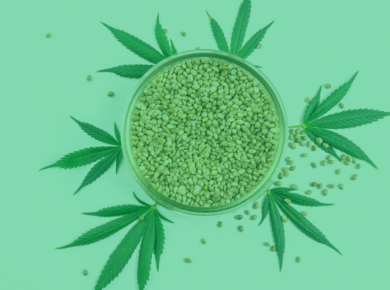Over the past decade, the cannabis- and hemp-derived compound cannabidiol (CBD) as well as other cannabinoids have taken center stage in the ongoing revolution of hemp. This is mostly due to the work of researchers, who through numerous independent studies have found evidence of various therapeutic properties in CBD. Today, both natural and synthetic CBD are commonly used around the world.
The Evolving Landscape of CBD: Natural vs. Synthetic Cannabinoids
Over the past decade, the surge in interest and research around cannabidiol (CBD) and other cannabinoids has been nothing short of revolutionary. This newfound attention largely stems from scientific studies that have consistently highlighted CBD’s potential therapeutic benefits. Currently, both natural and synthetic forms of CBD are readily available on the market, but it’s important to understand the nuances between them.
Understanding CBD Quality: Pharmaceutical-Grade vs. Over-The-Counter
The scientific literature on CBD’s health benefits predominantly focuses on pharmaceutical-grade CBD, which differs substantially from over-the-counter CBD products. As of my last update, the only FDA-approved CBD-based medication is Epidiolex. Despite this, many physicians are still cautious about prescribing CBD, often suggesting it as a complementary treatment rather than a primary solution.

Consumer Experience with Over-The-Counter CBD
Over-the-counter CBD products have received a mixed bag of reviews. Some users report significant improvements in their symptoms, while others notice little to no change. The effectiveness of these products often depends on the source and quality of CBD used. In this article, we’ll delve into the distinctions between naturally-sourced and synthetic CBD, exploring the benefits and potential drawbacks of each.
Create Your Kush.com Account Today >>
Naturally-Sourced CBD: Origins and Benefits
Naturally-sourced CBD is derived from two primary plants: cannabis and hemp. There’s a compelling body of both scientific and anecdotal evidence suggesting that natural CBD can alleviate symptoms associated with various conditions, ranging from anxiety disorders to early-stage dementia. The therapeutic benefits are attributed to the rich profile of compounds found in cannabis and hemp plants.
Synthetic vs. Natural CBD: Understanding the Differences
Medical cannabis is legal in numerous states, but it remains federally illegal primarily due to the psychoactive properties of tetrahydrocannabinol (THC). Unlike THC, CBD lacks psychoactive effects, making it legal across all 50 states. One advantage of naturally-sourced CBD is the option to produce full-spectrum CBD, which includes other cannabinoids, enhancing its therapeutic potential.

The Science Behind Full-Spectrum CBD
Full-spectrum CBD is a formulation that contains other cannabinoids and terpenes, which are natural compounds that interact with the endocannabinoid system. According to the Entourage Effect theory proposed by S. Ben-Shabat and Rafael Mechoulam, these compounds can work synergistically to amplify the benefits of CBD. The 2018 Farm Bill further facilitated the sourcing of CBD from industrial hemp, providing a viable alternative for CBD production, albeit with fewer cannabinoids and terpenes compared to cannabis.
The Risks Associated with Synthetic CBD
As the cannabis industry continues to grow, some manufacturers are producing synthetic CBD to expedite production and maximize profits. These synthetic cannabinoids are chemically engineered, often using potentially harmful substances like fluoride or bromide. While marketed as equally effective and safe, synthetic CBD has been linked to serious health risks.
A seminal study by the Journal of Medical Phyto Research found that synthetic CBD led to elevated levels of liver enzymes (ALT and AST), indicating the body’s struggle to metabolize these synthetic compounds. Additionally, the FDA has issued warnings about the health risks of synthetic cannabinoids, linking them to severe illnesses and even fatalities.
The State of Synthetic CBD Regulation
Currently, synthetic CBD products are among the least regulated in the industry. The lack of oversight, coupled with misleading labeling and marketing tactics, has unfortunately tainted the public perception of CBD as a whole. This negative impact is further exacerbated by news reports of adverse reactions and fatalities linked to synthetic CBD.
Create Your Kush.com Account Today >>
The Case for Natural CBD
Given the current landscape, consumers seeking the therapeutic benefits of CBD are likely better off sticking to naturally-sourced products. While there may be a future for synthetic cannabinoids as science and regulation evolve, for now, natural CBD appears to offer a safer and more effective alternative.
In summary, if you’re considering CBD as a supplement or alternative treatment, it’s crucial to do your research and opt for products sourced from reputable, natural origins.
Create Your Kush.com Account Today >>

How are synthetic CBD & cannabinoids designed to be used?
Synthesized CBD and cannabinoids are meant to be sprayed on dried and shredded plant material, as with synthetic terpenes which are much less dangerous. While synthetic terpenes are simply manufactured for flavoring natural plant matter similarly to popular strains of cannabis, synthetic CBD is designed to mimic the effects of natural CBD — and that’s where potentially harmful chemicals such as bromide and fluoride come in.



